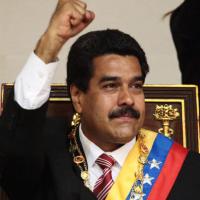
Just over a month since the death of Chavez and with less than a week till the presidential elections, Venezuelans are experiencing the highest level of political polarization seen in years.
Although the election period is the shortest in Venezuela’s history, the ten days of official election campaigning have been more intense than most previous elections.
The daily insults traded between the right-wing candidate, Henrique Capriles, and Bolivarian Nicolás Maduro, including accusations and counter-accusations of fraud and conspiracy, and the barrage of media propaganda as both candidates travel the country to speak before enormous demonstrations can seem at times overwhelming.
Capriles, the right wing ‘unity’ candidate, has opportunistically tried to portray himself as a defender of the poor and working class, even telling supporters at one demonstration that the missions will be safe if he is elected but would be under threat from a Maduro Government. Capriles has more than once described himself as a ‘progressive’ and states that he will represent everyone, especially the ‘poor’. One of the main slogans of the right-wing campaign is ‘We are all Venezuelans’.
After weeks of telling supporters that they were unlikely to win this election, Capriles changed tactics at his campaign’s march in Caracas on Sunday and announced to the hundreds of thousands attending that ‘together’ they could win and that now he could say that they are ‘winning this process’.
Although the right wing have been able to mobilize significant support, it is still unlikely to secure them a victory. Most polls at the moment still put Maduro 8-15% points ahead.
As Socialismo Revolucionario has previously explained, the majority of Venezuelans had high expectations and hopes of Chavez. Chavez’s final national broadcast on 8 December last year was to name Maduro as his successor, which, if for no other reason, will see many transfer their vote to him unconditionally. It is clear that, even now, there are important differences between a potential Maduro Government and a right wing one, no matter how they try to paint themselves, and their hypocrisy must be exposed.
However, a vote for Maduro will not secure a continuation and deepening of the Bolivarian Revolution, regardless of his pledges that it will. During the election campaign, there has been very little talk of how he intends to do this and the main document of the campaign is unchanged from Chavez’s 2012 ‘Plan of the Homeland’, outlining the tasks for the next six years. The government’s campaign is heavily focused on Chavez, with Maduro calling himself Chavez’s ‘son’ and even his ‘apostle’ on many occasions.
Maduro’s call, three weeks ago, for the left to ‘conform’ and that ‘now is not the time’ for debate has had an impact. It has effectively closed down real discussion and revolutionary debate. Maduro told workers a few weeks ago that they may have problems but now is not the time to talk about them; instead, they must defend the fatherland.
However, the day-to-day issues facing the workers and the poor will need to be addressed, not to mention the unstable economic situation which exists. Such issues will have no resolution under a capitalist system through further economic reforms and the need to fight for genuine democratic socialism is more urgent than ever. The struggle to transform society cannot come from an election. The urgent task of the left is to fight for revolutionary and democratic socialism and, to achieve this, open revolutionary debate and organisation is needed.
A vote for Maduro is not enough!
Special financial appeal to all readers of socialistworld.net |
Support building alternative socialist media Socialistworld.net provides a unique analysis and perspective of world events. Socialistworld.net also plays a crucial role in building the struggle for socialism across all continents. Capitalism has failed! Assist us to build the fight-back and prepare for the stormy period of class struggles ahead. Please make a donation to help us reach more readers and to widen our socialist campaigning work across the world. |
Donate via Paypal |
| M | T | W | T | F | S | S |
|---|---|---|---|---|---|---|
| 1 | 2 | 3 | 4 | 5 | 6 | 7 |
| 8 | 9 | 10 | 11 | 12 | 13 | 14 |
| 15 | 16 | 17 | 18 | 19 | 20 | 21 |
| 22 | 23 | 24 | 25 | 26 | 27 | 28 |
| 29 | 30 | |||||


Be the first to comment